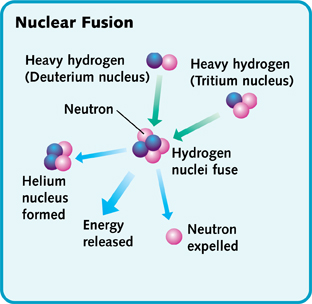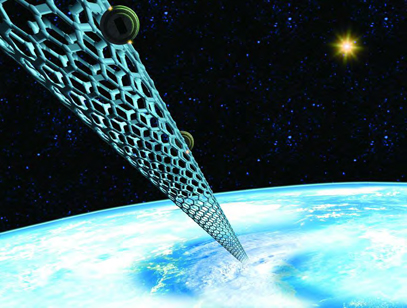Into the Future
Carbon Leads the Way, Mysteries of Matter
The science of matter is more important then ever. New materials will help scientists create amazing new technology. We may also discover much more about how matter works.
FUTURE FUSION
Nuclear fusion is a way of joining atoms together to release energy. It is safer than nuclear fission (see page 39). It powers the Sun, making it give off heat and light. Scientists are trying to find a way to make nuclear fusion work on Earth. We could get energy from it.

 The space elevator could look like this.
The space elevator could look like this.
Carbon Leads the Way
Carbon buckyballs and nanotubes (see page 27) can be used in nanotechnology—building tiny machines. These machines could be used to do repairs inside the body or clean up pollution.
Another idea being planned is a space elevator. It would link Earth's surface to a satellite in orbit. Astronauts and supplies could travel up it to space. For a long time, this idea was thought impossible. But carbon nanotubes are so strong and light, they could be used to build it.
Mysteries of Matter
Scientists still do not really know what matter actually is. We know about atoms, and the parts they are made of. But what are they made of? Scientists are working hard to solve these puzzles. When they do, we might find new ways to turn matter into energy. Maybe we will be even able to escape gravity.
Additional topics
- Glossary
- Matter and Materials - Using Materials, Material Words, Properties of Materials, The Right Material, Inventing Materials, Materials For Energy
- Other Free Encyclopedias